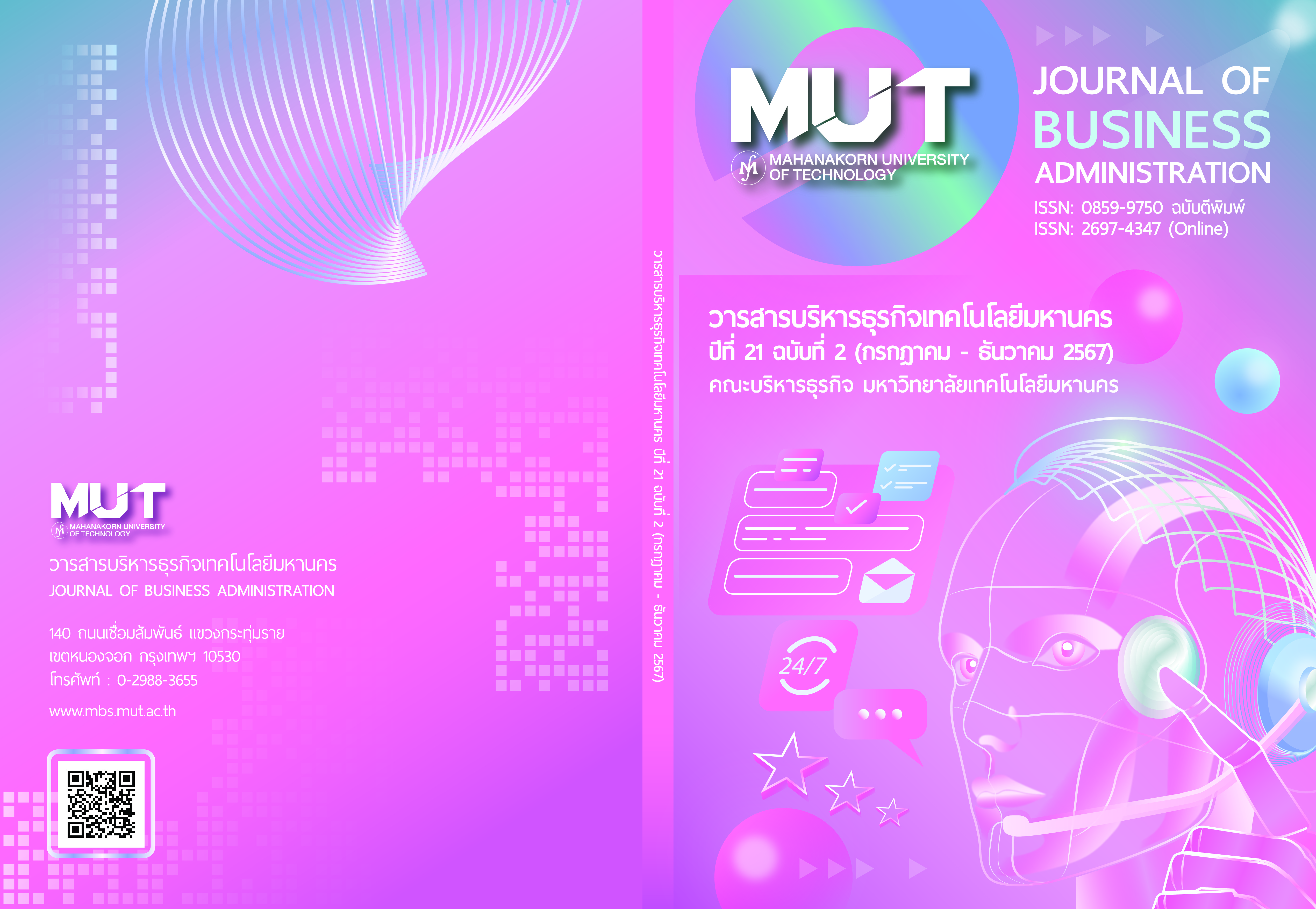ปัจจัยที่ส่งผลต่อการยอมรับการใช้งานใบกำกับภาษีอิเล็กทรอนิกส์และ ใบรับอิเล็กทรอนิกส์ (e-Tax Invoice & e-Receipt) ของผู้ประกอบการ ในเขตสำนักงานสรรพากรพื้นที่กรุงเทพมหานคร 21
คำสำคัญ:
ใบกำกับภาษีอิเล็กทรอนิกส์, ระบบ e-Tax Invoice & e-Receipt, การยอมรับเทคโนโลยีบทคัดย่อ
การวิจัยนี้มีวัตถุประสงค์เพื่อศึกษา 1). ปัจจัยพื้นฐานของผู้ประกอบการ 2).ปัจจัยการยอมรับเทคโนโลยี ปัจจัยการรับรู้ความเสี่ยง และ ปัจจัยการยอมรับการใช้งานระบบใบกำกับภาษีอิเล็กทรอนิกส์และใบรับอิเล็กทรอนิกส์ (e-Tax Invoice & e-Receipt) 3).เพื่อศึกษาอิทธิพลของปัจจัยต่าง ๆ ได้แก่ ด้านการรับรู้ถึงประโยชน์ ด้านการรับรู้ว่าง่ายในการใช้งาน ด้านอิทธิพลทางสังคม และด้านการรับรู้ความเสี่ยงที่ส่งผลต่อการยอมรับการใช้งานระบบใบกำกับภาษีอิเล็กทรอนิกส์และใบรับอิเล็กทรอนิกส์ (e-Tax Invoice & e-Receipt) ของผู้ประกอบการในเขตสำนักงานสรรพากรพื้นที่กรุงเทพมหานคร 21 โดยใช้ระเบียบวิธีวิจัยเชิงปริมาณกับกลุ่มตัวอย่างคือ ผู้ประกอบการในเขตสำนักงานสรรพากรพื้นที่กรุงเทพมหานคร 21 จำนวน 400 คน สุ่มตัวอย่างแบบสะดวก (Convience Sampling) เก็บข้อมูลด้วยแบบสอบถามที่มีลักษณะแบบมาตรวัดประมาณค่า 5 ระดับ และวิเคราะห์ด้วยสถิติหาความถี่ ค่าเฉลี่ย ร้อยละ ส่วนเบี่ยงเบนมาตรฐาน สถิติที่ใช้ในการทดสอบสมมติฐาน คือ การวิเคราะห์ความแปรปรวนแบบทางเดียว และการวิเคราะห์การถดถอยพหุคูณ
ผลการวิจัยพบว่า กิจการขนาดกลางที่มีรายได้มากกว่า 30 ล้านบาท แต่ไม่เกิน 500 ล้านบาทต่อปี และกิจการที่มีระยะเวลาดำเนินกิจการมากกว่า 10 ปี มีการยอมรับการใช้งานระบบมากกว่ากิจการรูปแบบอื่น และปัจจัยด้านการรับรู้ว่าง่ายในการใช้งานเป็นปัจจัยที่ส่งผลต่อการยอมรับการใช้งานระบบ e-Tax Invoice & e-Receipt สูงสุด รองลงมาเป็นด้านอิทธิพลทางสังคม ด้านรับรู้ถึงประโยชน์ และด้านการรับรู้ความเสี่ยง ตามลำดับ โดยปัจจัยดังกล่าวสามารถพยากรณ์การยอมรับการใช้งานระบบใบกำกับภาษีอิเล็กทรอนิกส์และใบรับอิเล็กทรอนิกส์ (e-Tax Invoice & e-Receip ของผู้ประกอบการได้ร้อยละ 71 อย่างมีนัยสำคัญทางสถิติที่ระดับ 0.05 โดยหน่วยงานภาครัฐสามารถนำผลวิจัยไปใช้เป็นแนวทางจัดทำแผนกำหนดนโยบายหรือมาตรการที่มีประสิทธิภาพในการผลักดันให้ผู้ประกอบการเข้าร่วมระบบเพิ่มขึ้นต่อไป
เอกสารอ้างอิง
Ajzen, I. and Fishbein, M. 1975. Belief, Attitude, Intention, and Behavior: An Introduction to Theory and Research. Reading. MA: Addison-Wesley.
Bahari, A., Mus, A. R. and Mursalim, M. 2020. Perceived Ease, Benefits and Perceived Enjoyment of E-Invoice User Interests. Point of View Research Accounting and Auditing. Vol. 1. No. 3. 33-42.
Bauer, R. A. 1960. Consumer Behavior as Risk Taking. In: Hancock, R.S., Ed., Dynamic Marketing for a Changing World. Proceedings of the 43rd. Conference of the American Marketing Association. 389-398.
Bauer, R. A. 1967. Consumer Behavior as Risk Taking. In: Cox, D.F., Ed., Risk Taking & Information Handling in Consumer Behavior. Graduate School of Business Administration. Harvard University. Boston. 23-33.
Bhattarai S. and Maharjan S. 2020. Determining the Factors Affecting on Digital Learning Adoption among the Students in Kathmandu Valley: An Application of Technology Acceptance Model (TAM). International Journal of Engineering and Management Research. Vol. 10. No. 3. 131-141.
Bumrungpone, P. 2020. Technology acceptance and information system quality affecting decision to use corporate income tax filing service online taxpayer of business industry. Master of Business Administration Thesis. Business Innovation Management. Silpakorn University.
Burinwattana S., Chittichai Horthong, C., Prathanadi S., Ngankhokkruad J., Kulsuphachote N. and Apisithpinyo, B. 2021. Influence of technology acceptance on intention to use e-tax system and e-transaction documents scheme of accountants in Thailand. Phetchabun Rajabhat Journal. Vol. 23. No. 2. 87-96.
Chang, H. H., Fu, C. S. and Jain, H. T. 2016. Modifying UTAUT and Innovation Diffusion Theory to Reveal Online Shopping Behavior: Familiarity and Perceived Risk as Mediators. Information Development. Vol. 32. No.5. 1757-1773.
Damlaelib, S. 2023. Factors affecting the intension of entrepreneurs to use the electronic tax invoice system: a case study of a corporate entrepreneur registered for VAT in Phitsanulok province. Maejo Business Review. Vol. 5. No. 1. 21-45.
Davis, F. D., Bagozzi, R. P. and Warshaw, P. R. 1989. Perceived Usefulness, Perceived Ease of Use, and User Acceptance of Information Technology. MIS Quarterly. Vol. 13. No. 3. 319-340.
Department of Business Development Ministry of Commerce. 2024. Information on the operating businesses in 2024: Search by area. Retrieved March 12, 2024 from https://datawarehouse.dbd.go.th/area/overview
Dewi, R. P. L. and Ketut, R. I. 2020. The Role of Trust in Mediating the Effect of Perceived Risk and Subjective Norm on Continuous Usage Intention on GoPay Users in Denpasar. Russian Journal of Agricultural and Socio-Economic Sciences. Vol. 12. No. 108. 87-98.
Digital Government Development Agency (Public Organization) (DGA). 2023. DGA with a new role as ‘Smart Connector’. Retrieved March 9, 2024 from https://www.dga.or.th/document-sharing/dga-channel/88106
Electronic Tax Administration Division Revenue Department. 2019. Overview of preparation and submission of e-Tax Invoice & e-Receipt. Retrieved March 17, 2024 from https://etax.rd.go.th/etax_staticpage/app/emag/flipbook/01_Overview.pdf
Farzianpour, F., Pishdar, M., Shakib, M. D. and Toloun, M. R. S. H. 2014. Consumers’ Perceived Risk and Its Effect on Adoption of Online Banking Services. American Journal of Applied Sciences. Vol. 11. No. 11. 47-56.
Featherman, M. and Pavlou, P. 2003. Predicting e-Services Adoption: A Perceived Risk Facets Perspective. International Journal of Human Computer Studies. Vol. 59. 451-474.
Fornell, C. and Larcker, D. F. 1981. Structural Equation Models with Unobservable Variables and Measurement Error. Journal of Marketing Research. Vol. 18. No. 1. 39–50.
Foster, G. M. 1973. Tradition Societies and Technological Change. New York: Harper and Row Publishers. 146-147.
Hair, J., Sarstedt, M., Hopkins, L. and Kuppelwieser, V. 2014 Partial Least Squares Structural Equation Modeling (PLS-SEM): An Emerging Tool in Business Research. European Business Review. Vol. 26. 106-121.
Hanucharoenkul, K. and Parinnapha, C. 2023. The factor of the revenue department’s service system for preparation and delivery electronic tax invoice and electronic receipts. JSSP: Journal of Social Science Panyapat 2023. Vol. 5. No. 2. 207-222.
Inphirom, S., Thamrongsinthaworn, S., Sanglimsuwan, S. and Anantanand, S. 2022. User acceptance model on e-Tax Invoice and e-Receipt system in Thailand. Burapha Journal of Business Management. Vol. 11. No. 2. 66-94.
Jinukul, K. 2019. Perceived risk and trust influencing the transactional Intention through mobile banking among customers of Krung Thai bank public company limited in Songkhla province. Master of Business Administration in Marketing Thesis. Prince of Songkla University.
Khiewrattana, C. 2020. Factors of technology acceptance influencing decision making on QR code usage via smartphone: A case study of Bangkok bank public company limited’s customers in Hatyai district, Songkhla province. Master of Business Administration Thesis. Prince of Songkla University.
Kongkaew, K. 2023. Factors affecting the acceptance of Revenue Department e-filing. Master of Business Administration Thesis. Prince of Songkla University.
Mankhong, G. 2018. A study of components affecting adoption of electronic tax invoice processing and delivery system (e-tax invoice) of entrepreneur in Kamphaeng Phet province. Master of Accountancy Program. College of Innovative Business and Accountancy. Dhurajij Pundit University.
Marriott, H. R. and Williams, M. D. 2018. Exploring Consumers Perceived Risk and Trust for Mobile Shopping: A Theoretical Framework and Empirical Study. Journal of Retailing and Consumer Services. Vol. 42. 133-146.
Meelap, J., Tangcharoen, K., Phutthipan, N., Boriphan, W. and Noknoi, J. 2018. Intention to use social media for business purposes. The 10th National Academic Conference “Walailak Research” on March 27-28, 2018 Nakhon Si Thammarat Province.
Ministry of Finance Information Management Department. 2023. MOF open data: Government Revenue. Retrieved on March 17, 2024 from https://dataservices.mof.go.th
Ninkhampee, P. 2019. Factors influencing the efficiency of accounting information systems: A case study of small and medium enterprise (SMEs) in eastern Thailand. Master of Accountancy School of Accountancy Independent Study. Sripatum University.
Peter, J. P. and Ryan, M. J. 1976. An investigation of perceived risk at the brand level. Journal of Marketing Research. Vol. 13. No. 2. 184-188.
Pikkarainen, T., Pikkarainen, K., Karjaluoto, H. and Pahnila, S. 2004. Consumer Acceptance of Online Banking: An Extension of the Technology Acceptance Model. Internet Research. Vol. 14. 224-235.
Policy and Tax Planning Division Revenue Department. 2016. Implementation of the National e-Payment Strategic Plan. Retrieved March 9, 2024 from https://www.rd.go.th/publish/seminar/e-Payment_2-3-6-7.pdf
Poolsap, S. 2019. Technology acceptance affecting the intention of using social security fund contributions payment service via the electronic system (e-Payment) of the social security office. Master of Accountancy Independent Study. Rajamangala University of Technology Thanyaburi.
Revenue Department. 2017. Revenue Department Operation Plan, Fiscal Year 2017. Retrieved March 9, 2024 from http://download.rd.go.th/fileadmin/download/plan/RD_plan_60.pdf
Revenue Department. 2023. Revenue Department Operation Plan, Fiscal Year 2023 and 5-Year Period (2023 - 2027) Revised edition. Retrieved March 9, 2024 from https://www.rd.go.th/fileadmin/download/ plan/Plan_66_Internet_edit1.pdf
Revenue Department. 2024. Revenue Department Operation Plan, Fiscal Year 2024. Retrieved March 9, 2024 from https://www.rd.go.th/fileadmin/download/plan/RD_plan_2567.pdf
Revenue Department. 2024. The list of e-Tax invoice by Digital Signature registered users. Retrieved March 17, 2024 from https://etax.rd.go.th/etax_staticpage/app/#/index/registered
Revenue Department. 2024. The list of e-Tax invoice by Time Stamp registered users. Retrieved March 17, 2024 from https://interapp3.rd.go.th/signed_inter/publish/register.php
Rifat, A., Nisha, N. and Iqbal, M. 2019.Predicting e-tax service adoption: Integrating perceived risk, service quality and TAM. Journal of Electronic Commerce in Organizations. Vol. 17. No. 3. 71–100.
Rogers, E. M. and Shoemaker, F. F. 1978. Communication of innovations: A cross–cultural approach. New York: The Free Press.
Saosoong, S. 2020. System quality and user attitudes affecting the use of electronic tax system services of small and medium businesses in Bangkok. Master of Accountancy School of Accountancy Independent Study. Sripatum University.
Satbamrung, S. 2020. Factors affecting the adoption of government e-service: a case study of tax incentives service, the customs department. Degree of Master of Public Administration in Public Administration Department of Public Administration Independent Study. Faculty of Political Science. Chulalongkorn University.
Sathanpong, P. 2021. Factors affecting success in participating in the tax systems and electronic transaction documentation of the e-tax invoice and e-receipt projects. Master of Public Administration. Faculty of Social Sciences. Srinakharinwirot University.
Soneka, P.N. and Phiri, J. 2019. A Model for Improving E-Tax Systems Adoption in Rural Zambia Based on the TAM Model. Open Journal of Business and Management. Vol. 7. 908-918.
Sukkomol S. 2019. Factor affecting acceptance of Technology and decision to use e-Tax Invoice & e-Receipt. Master of Accountancy Thematic Paper. College of Innovative Business and Accountancy. Dhurakij Pundit University.
Tanapawat, A. and Saraphat, S. 2023. Conceptual Framework of Acceptance of Technology and Quality of Information Technology Systems That Affects The Intention to Use The Internet Corporate Income Tax Return Filing Service. JSSP: Journal of Social Science Panyapat 2023. Vol. 5. No. 2. 363-374.
Treepong, T., Mongkolnipath, K., Bunthong, V., Maneenak, N. and Namwong, K. 2023. Knowledge and Understanding of the e-Tax Invoice & e-Receipt System of Hoteliers in Hua Hin District, Prachuap Khiri Khan Province. Journal of Innovation in Business, Management and Social Sciences. Vol. 4 No. 1. 16-29.
Venkatesh, V., Morris, M. G., Davis, G. B. And Davis, F. D. 2003. User acceptance of information technology: toward a unified view. MIS Quarterly. Vol. 27. No. 3. 425–478.
Wanitsumpun, J. 2020. The acceptance factor of the electronic receipt of the consumer who purchases in the supermarket of a department store in Bangkok. Master of Business Administration. Faculty of Business Administration for Society. Srinakharinwirot University.
Workpointtoday. 2022. Tracing Blockbuster's Decline from 9,000 branches to 1: A Costly Lesson in Ignoring Waves of Change. Retrieved May 31, 2024 from https://workpointtoday.com/blockbuster-brand-story
Yamane, T. 1973. Statistics: An Introductory Analysis. 3rd Ed. New York: Harper and Row Publications.
Zainavy, S. F., Pratama, B. C., Fakhruddin, I. and Pandansari, T. 2023. E-Filing report: IS Performance expectancy, Effort Expectancy, Trust, And Perceived Risk Influencing the intention to use the system. Soedirman Accounting Review (SAR): Journal of Accounting and Business. Vol. 08. No. 2. 234-250.
ไฟล์ประกอบ
เผยแพร่แล้ว
ฉบับ
ประเภทบทความ
สัญญาอนุญาต

อนุญาตภายใต้เงื่อนไข Creative Commons Attribution-NonCommercial-NoDerivatives 4.0 International License.
ข้อความ ข้อคิดเห็น ข้อมูล เนื้อหา รูปภาพ แผนภูมิ แผนผัง เป็นต้น ที่ปรากฏและแสดงในบทความต่างๆ ในวารสารบริหารธุรกิจเทคโนโลยีมหานคร ถือเป็นความรับผิดชอบโดยตรงของผู้เขียนบทความนั้นๆ มิใช่เป็นความรับผิดชอบใดๆ ของวารสารบริหารธุรกิจเทคโนโลยีมหานคร และมหาวิทยาลัยเทคโนโลยีมหานคร
บทความที่ตีพิมพ์ในวารสารบริหารธุรกิจเทคโนโลยีมหานคร ถือเป็นลิขสิทธิ์เฉพาะของคณะบริหารธุรกิจ มหาวิทยาลัยเทคโนโลยีมหานคร หากบุคคลหรือหน่วยงานใดต้องการนำทั้งหมดหรือส่วนใดส่วนหนึ่งไปเผยแพร่ต่อหรือเพื่อกระทำการใดๆ จะต้องได้รับการอนุญาตเป็นลายลักษณ์อักษรจากคณะบริหารธุรกิจ มหาวิทยาลัยเทคโนโลยีมหานครก่อนเท่านั้น


